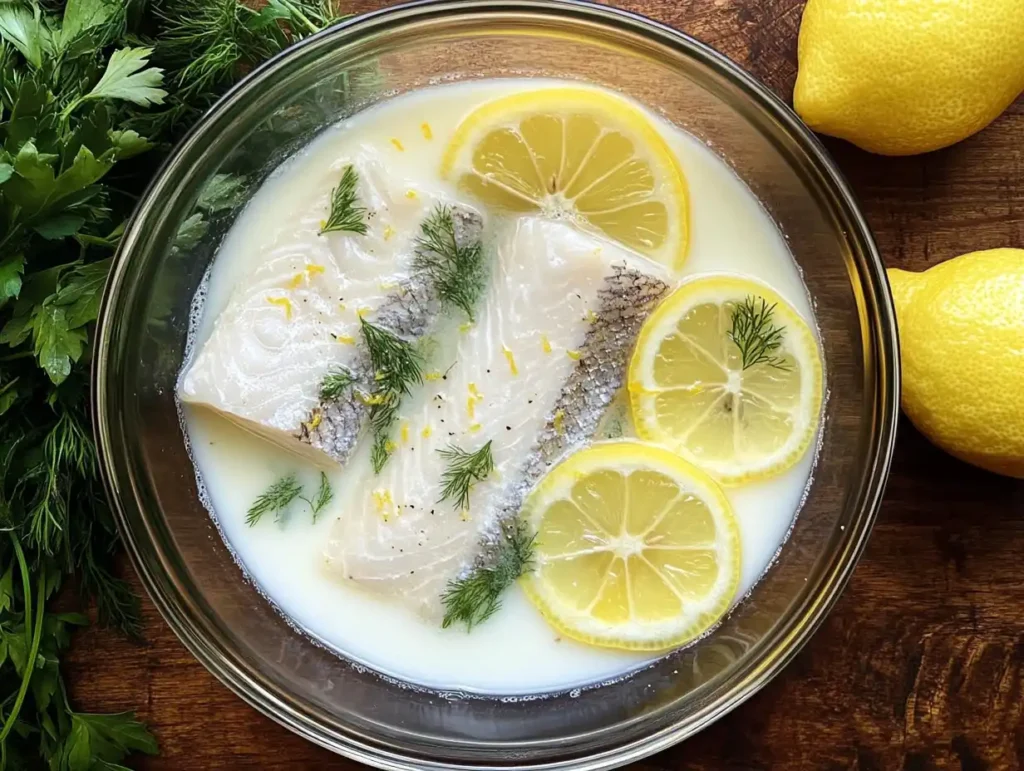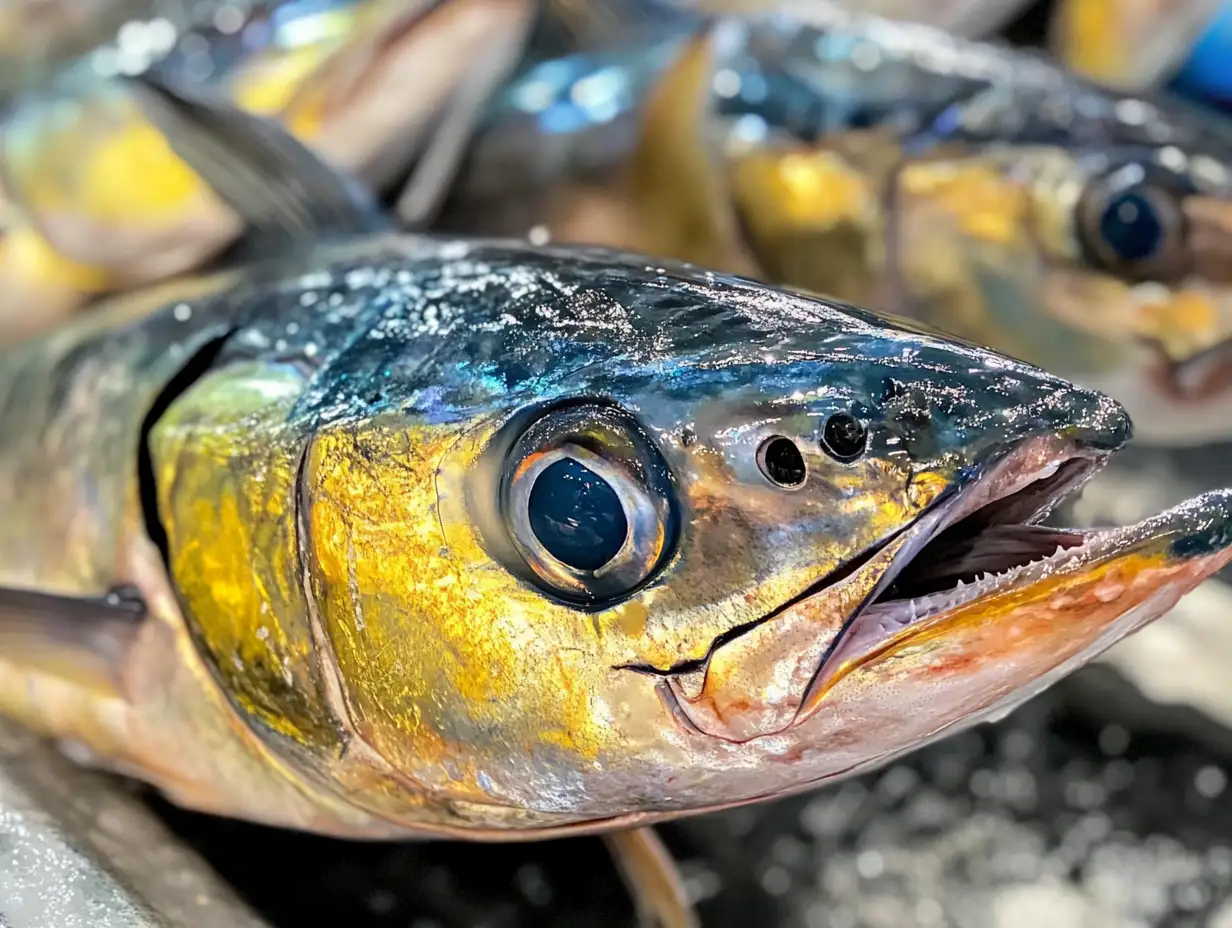What helps fish not taste fishy? Fish is a beloved protein worldwide, but its “fishy” taste or smell can sometimes be off-putting. Thankfully, there are straightforward ways to tackle this issue. Let’s dive into why fish can taste fishy and the steps you can take to fix it.
Table of contents
What Causes Fish to Taste Fishy?
Fish can develop a “fishy” taste due to various factors, with trimethylamine (TMA) playing a key role. TMA is a compound that forms as fish begins to spoil, and it is largely responsible for the odor and flavor many people associate with “fishy” fish.
How Trimethylamine Affects Fish Flavor
As soon as fish is caught, its natural enzymes and bacteria begin breaking down its flesh. This process creates TMA, which intensifies the longer the fish is stored improperly or left at warm temperatures. Fresh fish, on the other hand, emits a mild ocean-like aroma, not the pungent smell of TMA.
Moreover, some fish naturally produce higher levels of this compound. Oily fish, such as mackerel, sardines, or anchovies, tend to have a more robust flavor, while mild white fish like cod or tilapia are less prone to strong smells.
Storage Practices and Their Impact
Fish stored incorrectly—such as being left at room temperature for too long or not packed on ice—degrades much faster. Proper storage slows the production of TMA, ensuring the fish remains as fresh as possible until cooked.
Habitat and Diet’s Role in Taste
Interestingly, a fish’s habitat and diet also contribute to its flavor. Saltwater fish, which consume marine life like algae or crustaceans, often have a stronger taste than freshwater fish, which may feed on aquatic plants. Additionally, wild-caught fish generally have a bolder flavor compared to farmed fish due to their diverse diet.
Quick Tip for Freshness
To minimize any “fishy” flavor, always buy fish from reputable sellers who maintain high standards for cleanliness and refrigeration. Additionally, look for fish with clear eyes, firm flesh, and a mild, briny scent.
Why Some Fish Taste Stronger Than Others
- High-fat content: Fatty fish like salmon or tuna have rich flavors that can lean toward fishy if improperly prepared.
- Lean fish varieties: Mild-tasting options, such as flounder or sole, are often better choices for those who prefer a subtler flavor.
Freshness Is Key: How to Select Fresh Fish
The first step to ensuring your fish doesn’t taste fishy starts at the market. Choosing the freshest fish available dramatically reduces the chance of dealing with undesirable smells and flavors.
How to Recognize Fresh Fish
To avoid any guesswork, keep these signs in mind when shopping for fish:
- Clear Eyes: Fresh fish should have bright, clear eyes that appear slightly convex. Cloudy or sunken eyes are a red flag.
- Firm Flesh: Press the fish gently with your finger; it should spring back rather than leaving an indentation.
- Mild Scent: Fresh fish smells slightly salty, like the ocean. If it smells overly strong or “off,” it’s not fresh.
- Moist Skin or Scales: The surface of the fish should look moist and shiny, not dry or flaky.
For fillets, ensure the color looks vibrant and natural. Any dull, grayish, or dry-looking flesh should be avoided.
Frozen vs. Fresh: Which Is Better?
Interestingly, frozen fish can sometimes be fresher than “fresh” fish, especially if it was frozen right after being caught. When buying frozen fish, check for any ice crystals or signs of freezer burn, as these indicate poor storage. Properly frozen fish retains its flavor and texture well.
Mild-Tasting Fish for Beginners
If you’re new to cooking fish, opt for mild varieties that are less likely to taste fishy. Some popular choices include:
- Tilapia
- Cod
- Halibut
- Flounder
- Sole
These fish have a subtle flavor that pairs well with a wide range of seasonings and side dishes.
Where to Buy Fresh Fish
Your best bet for fresh fish is a trusted fish market or the seafood counter at a well-maintained grocery store. If you live near the coast, look for local fishmongers who source their catch directly from fishermen.
Quick Tip: Ask Questions
Don’t hesitate to ask the seller questions about the fish’s source, when it was caught, or how it was stored. A knowledgeable fishmonger is an invaluable ally in your quest for fresh seafood.
Storing Your Fish at Home
Once you’ve selected fresh fish, storing it properly is essential to maintain its quality. Keep fish in the coldest part of your refrigerator, ideally on a bed of crushed ice. If you don’t plan to cook it within a day or two, freezing is your best option.
Best Practices for Prepping Fish at Home

How you handle and prepare fish at home can significantly influence its flavor. Proper preparation is crucial to eliminating that “fishy” taste, ensuring a clean and pleasant meal every time.
What helps fish not taste fishy? Rinse Thoroughly Before Cooking
Before anything else, rinse the fish under cold running water. This step helps remove any residual slime, surface bacteria, or loose scales that may contribute to an unpleasant odor. Cold water is best because it prevents the fish from warming up and starting to spoil prematurely.
What helps fish not taste fishy? Trim Away the Stronger-Tasting Parts
Some fishy flavors are concentrated in specific parts of the fish, such as the skin or dark meat. For a milder taste:
- Remove the skin entirely, especially for fish like salmon or mackerel.
- Trim away any dark, fatty portions, as these often have a stronger flavor.
These small adjustments can make a big difference, particularly for those who are sensitive to fishy tastes.
What helps fish not taste fishy? Soaking Methods to Neutralize Odor
One of the most effective ways to reduce the fishy taste is by soaking your fish before cooking. Several soaking techniques can help, and each method has its unique benefits:
Soaking Fish in Milk
- Milk is one of the most popular solutions because it neutralizes trimethylamine (TMA), the compound responsible for the fishy smell.
- To use this method, place the fish in a shallow dish and cover it with milk. Let it soak for 20–30 minutes, then pat dry before cooking.
Lemon or Vinegar Water
- For a quick acidic fix, mix equal parts lemon juice or vinegar with water and soak the fish for 10–15 minutes.
- The acid breaks down odors and brightens the fish’s flavor, making it taste fresher.
Buttermilk or Yogurt Marinades
- Buttermilk and yogurt contain both acids and fats, which can help mellow out fishy flavors.
- They are particularly effective for oily fish like salmon or trout. Let the fish sit in the marinade for about 30 minutes before cooking.
Avoid Cross-Contamination
Another important aspect of prepping fish is avoiding cross-contamination with other foods. Always:
- Use separate cutting boards and knives for raw fish.
- Clean utensils and surfaces with hot, soapy water immediately after use.
This not only preserves the flavor but also ensures food safety.
What Helps Fish Not Taste Fishy? Dry the Fish Before Cooking
After rinsing or soaking the fish, pat it dry with paper towels. Excess moisture can interfere with browning during cooking and may even intensify unwanted flavors.
Top Cooking Techniques for Delicious Fish

Cooking fish the right way can make all the difference in reducing its fishy flavor. By choosing appropriate methods and avoiding common mistakes, you can ensure your fish is tender, flavorful, and anything but off-putting.
Grilling and Baking: High-Heat Methods
- Grilling fish adds a smoky flavor that masks fishiness while creating a firm, flaky texture. Use a grill basket or foil to prevent the fish from sticking.
- Baking is another great option, especially when fish is paired with flavorful ingredients like garlic, herbs, and lemon. To lock in moisture, bake fish wrapped in parchment paper or foil.
Pro Tip: High-heat methods like grilling and broiling cook fish quickly, preventing the overcooking that can amplify fishy tastes.
Steaming: A Gentle Option for Freshness
Steaming is a gentle cooking method that preserves the natural flavor and moisture of fish. Add aromatics like ginger, scallions, and lemongrass to the steaming liquid for a subtle infusion of flavor. This method works particularly well for delicate, mild fish like sole or cod.
Pan-Searing: A Golden Crust with Maximum Flavor
Pan-searing creates a delicious golden crust that locks in flavor while minimizing fishiness. To sear fish effectively:
- Heat oil in a skillet until shimmering.
- Place the fish skin-side down (if you didn’t remove the skin) and cook until crispy.
- Flip carefully and finish cooking the other side.
Adding butter, garlic, or fresh herbs to the pan during the last few minutes enhances the dish further.
What Helps Fish Not Taste Fishy? Avoid Overcooking at All Costs
Overcooking fish is one of the quickest ways to intensify its fishy flavor. Fish should be cooked just until it becomes opaque and flakes easily with a fork. Keep these internal temperature guidelines in mind:
- White fish: 145°F (63°C)
- Salmon and tuna: Cook to your preferred level of doneness, but avoid high heat for too long.
What Helps Fish Not Taste Fishy? Using Marinades to Transform Fish
Marinating fish is an excellent way to reduce its fishiness and enhance its flavor. Citrus, acidic ingredients, and herbs work wonders to balance and brighten the taste of fish.
Recommended Marinade Combinations
- Citrus-Based: Lemon or lime juice with olive oil, garlic, and dill.
- Asian-Inspired: Soy sauce, ginger, sesame oil, and scallions.
- Herbaceous: Olive oil, thyme, rosemary, and parsley.
Let the fish marinate for 15–30 minutes, but avoid over-marinating, as the acids can break down the fish’s texture.
Seasonings and Side Dishes to Complement Fish
Pairing fish with the right seasonings and side dishes not only enhances its flavor but also ensures a balanced, enjoyable meal. The right combinations can mask any lingering fishiness while highlighting the fish’s natural taste.
What Helps Fish Not Taste Fishy? Seasonings That Mask Fishy Flavors
Certain seasonings work particularly well with fish, not just for flavor but also for neutralizing any unwanted tastes. Some tried-and-true options include:
- Lemon or Lime: The acidity cuts through strong flavors and adds brightness.
- Garlic and Onions: Both offer bold, savory notes that balance the natural sweetness of fish.
- Fresh Herbs: Dill, parsley, thyme, and cilantro bring a refreshing contrast.
- Spices: Paprika, cumin, and cayenne can mask fishiness with bold flavors.
Simple Seasoning Blend for Fish
Try this easy seasoning mix:
- 1 tsp paprika
- 1 tsp garlic powder
- ½ tsp onion powder
- ½ tsp salt
- ¼ tsp cayenne pepper
Sprinkle this mixture generously on your fish before cooking for a flavorful, fishy-free meal.
Best Side Dishes to Serve With Fish: What Helps Fish Not Taste Fishy?
The sides you choose can further enhance the dish while toning down any overpowering fishy notes. Consider these options:
Citrusy Salads
- A light salad with greens, oranges, and a citrus vinaigrette complements fish perfectly.
- Add avocado or nuts for a richer texture.
Roasted Vegetables
- Vegetables like asparagus, zucchini, or Brussels sprouts bring earthy flavors that balance out the fish’s sweetness.
- Roast them with olive oil, garlic, and lemon zest for an aromatic side.
Starches for Balance
- Rice Pilaf: A mild yet flavorful option that absorbs any extra marinade or sauce.
- Quinoa: Its nutty flavor pairs well with grilled or baked fish.
- Potatoes: Mashed, roasted, or baked potatoes provide a hearty, neutral base for the meal.
Pairing Based on Fish Type
- Mild Fish (Tilapia, Cod): Pair with light, citrusy sides and gentle seasonings.
- Rich Fish (Salmon, Tuna): Go for bold flavors like roasted vegetables or spicy marinades.
- Delicate Fish (Sole, Flounder): Stick to simple, refreshing sides like steamed greens.
By balancing fish with complementary sides and seasonings, you can create a meal that is both satisfying and free from any unwelcome flavors.
Mistakes That Make Fish Taste Worse
Even with the best intentions, some common mistakes can accidentally amplify the fishy taste of seafood. Avoiding these pitfalls will go a long way in ensuring your fish turns out as fresh and flavorful as possible.
Leaving Fish at Room Temperature Too Long
Fish is incredibly perishable, and leaving it out at room temperature for extended periods can speed up the formation of trimethylamine (TMA). Always keep fish chilled until you’re ready to cook it. If you’re thawing frozen fish, do so in the refrigerator rather than on the counter.
Improper Storage
Storing fish in the fridge without proper wrapping or insulation can lead to faster spoilage and absorption of odors from other foods. To keep fish fresh:
- Place it in an airtight container or wrap it tightly in plastic.
- Store it on ice if possible, as colder temperatures slow down spoilage.
Overcooking Fish
Overcooking is one of the most common mistakes that intensifies fishy flavors. Fish cooks quickly, and going beyond its ideal cooking time dries it out, concentrates its natural oils, and makes it tougher—all of which can highlight any unwanted flavors.
Pro Tip: Use a thermometer to check doneness. Fish is cooked when it reaches an internal temperature of 145°F (63°C) and flakes easily with a fork.
Using Fish Past Its Prime
Cooking fish that’s even slightly spoiled will ruin its flavor and make it unbearable to eat. When in doubt, inspect your fish for signs of spoilage:
- A strong, sour odor indicates it’s no longer fresh.
- Discoloration, such as dull or gray flesh, is a clear sign the fish has gone bad.
Heavy, Overpowering Sauces
While a good sauce can complement fish, overly rich or heavy sauces can clash with its delicate flavor and amplify its natural oils. Stick to lighter, citrus- or herb-based sauces that enhance rather than mask the taste.
Skipping the Soak or Rinse Step
Failing to rinse or soak fish before cooking can leave behind surface impurities or intensify the fishy smell. Always rinse fish thoroughly and consider soaking it in milk or lemon water for added freshness.
By sidestepping these common missteps, you can ensure that your fish is as mild, delicious, and inviting as possible.
Frequently Asked Questions About What Helps Fish Not Taste Fishy?
Many people have questions about reducing the fishy taste in seafood. Here are detailed answers to some of the most common queries, offering practical solutions for a better dining experience.
What is the best way to make fish taste less fishy?
The most effective way to reduce fishy taste is by ensuring the fish is fresh, soaking it in milk or an acidic solution, and cooking it using the right methods. Fresh fish naturally has a milder flavor, and milk neutralizes the trimethylamine (TMA) responsible for the fishy odor.
Does soaking fish in milk really work?
Yes, soaking fish in milk is one of the most popular and reliable methods to reduce fishy flavors. Milk contains casein, a protein that binds to TMA and removes it from the surface of the fish. After a 20–30 minute soak, the fish will have a much milder taste and smell.
Why do some fish taste fishier than others?
The taste of fish depends on factors like species, habitat, and fat content. Oily fish such as mackerel, sardines, and salmon naturally have stronger flavors due to their high fat content. In contrast, mild fish like cod, flounder, and tilapia are leaner and have a subtler taste.
Can you over-marinate fish?
Yes, fish can be over-marinated, especially in acidic marinades like lemon or vinegar. The acids break down the fish’s proteins, which can result in a mushy texture if marinated for too long. Ideally, marinate fish for 15–30 minutes to enhance flavor without compromising its texture.
What’s the best seasoning for non-fishy fish?
Seasonings like lemon, garlic, dill, parsley, and mild spices work exceptionally well for non-fishy fish. These ingredients not only complement the flavor of fish but also mask any subtle fishy notes.
How do you store fish to keep it fresh longer?
Proper storage is crucial for maintaining the freshness of fish. Refrigerate fish immediately after purchase, ideally on a bed of crushed ice or in an airtight container. If you don’t plan to cook it within 1–2 days, freeze the fish. Ensure it’s tightly wrapped or vacuum-sealed to prevent freezer burn and preserve its flavor.
Conclusion: What helps fish not taste fishy?
Reducing the fishy taste in seafood comes down to a few simple principles: choosing the freshest fish, preparing it properly, and cooking it with flavorful ingredients. By soaking fish in milk, using fresh herbs and spices, and avoiding overcooking, you can create meals that showcase the best of seafood without any unpleasant flavors. Armed with these tips, even the most hesitant fish eater can enjoy the benefits of this nutritious and versatile protein.
